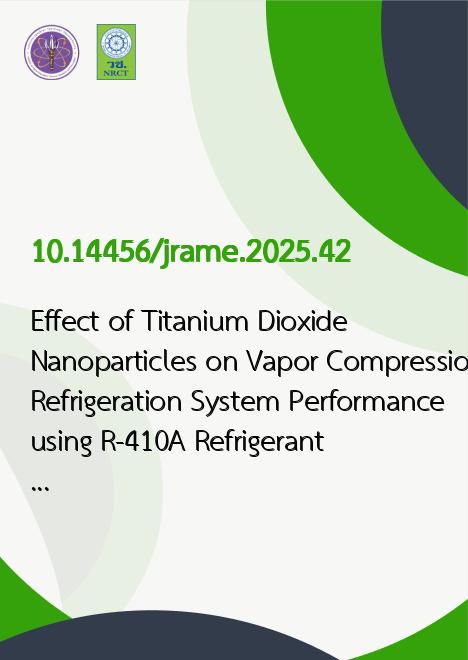
|
Effect of Titanium Dioxide Nanoparticles on Vapor Compression Refrigeration System Performance using R-410A Refrigerant and Polyolester Oil |
|---|---|
| รหัสดีโอไอ | |
| Creator | 1. D. P. Panchve 2. M. P. Ray 3. D. K. Dond 4. S. R. Suryawanshi |
| Title | Effect of Titanium Dioxide Nanoparticles on Vapor Compression Refrigeration System Performance using R-410A Refrigerant and Polyolester Oil |
| Publisher | Thai Society of Mechanical Engineers (TSME) |
| Publication Year | 2568 |
| Journal Title | Journal of Research and Applications in Mechanical Engineering (JRAME) |
| Journal Vol. | 13 |
| Journal No. | 3 |
| Page no. | JRAME-25-13-042 (p.1-11) |
| Keyword | Titanium dioxide nanoparticles, Nanolubricant, Polyolester oil, R410A refrigerant |
| URL Website | https://ph01.tci-thaijo.org/index.php/jrame/index |
| Website title | Journal of Research and Applications in Mechanical Engineering (JRAME) |
| ISSN | 2229-2152 |
| Abstract | In this research, titanium dioxide nanoparticles were dispersed in polyolester oil to form a nanolubricant. The impact of this nanolubricant on the vapor compression refrigeration system performance, operating with R410A refrigerant was studied. The experimentation involved mixing different quantities of nanoparticles by mass into the POE lubricant. The quantities of TiO2 nanoparticles used were 0.5% (1.221 g/L), and 1% (2.442 g/L) to create nanolubricant mixtures. A surfactant was added to prevent agglomeration. The refrigeration system functionality was compared using parameters such as the Coefficient of Performance (COP), refrigerating effect (RE), and compressor energy consumption. Several trial runs were conducted to obtain more accurate results and conclusions. It was observed that the refrigerating effect increased by 4.70% and 9.77% for nanoparticle concentrations of 0.5% and 1%, respectively, compared to plain lubricant oil without nanoparticles. No significant variation in compressor power consumption was observed for different nanolubricant concentrations. The COP of the system was enhanced by 4.72% and 9.47% for nanoparticle concentrations of 0.5% and 1%, respectively, compared to plain lubricant oil without nanoparticles. |
